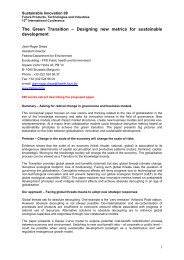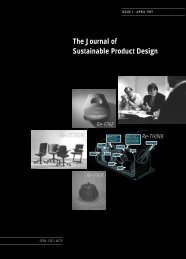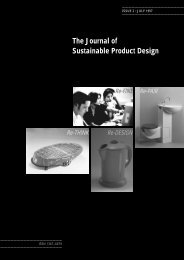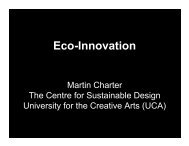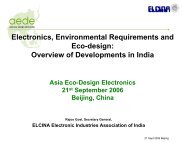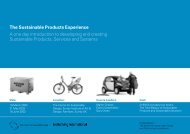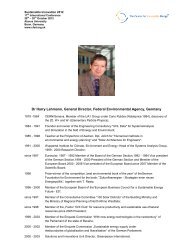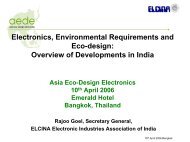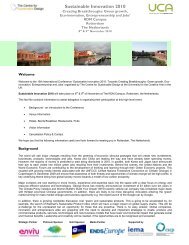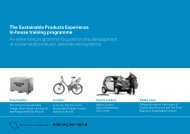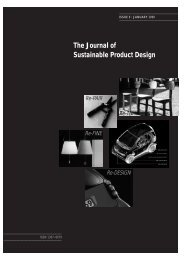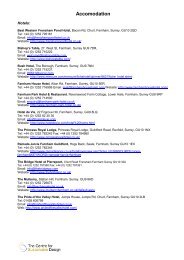Country report on the Indian electronics sector - The Centre for ...
Country report on the Indian electronics sector - The Centre for ...
Country report on the Indian electronics sector - The Centre for ...
You also want an ePaper? Increase the reach of your titles
YUMPU automatically turns print PDFs into web optimized ePapers that Google loves.
3–4 May 2006, organised by <strong>the</strong> Ministry of Envir<strong>on</strong>ment and<br />
Forests (MOEF), Government of India and German Technical<br />
Cooperati<strong>on</strong> (GTZ). This draft is compiled by ASEM-GTZ<br />
(Advisory Services <strong>for</strong> Envir<strong>on</strong>ment Management) <strong>for</strong> MOEF.<br />
O<strong>the</strong>r important legislati<strong>on</strong> with respect to Labour and<br />
governance of factories are listed below. <strong>The</strong> Directorate<br />
General, Factory Advice Service and Labour Institutes (<strong>for</strong>merly<br />
<strong>the</strong> Chief Adviser of factories), attached to <strong>the</strong> Ministry of<br />
Labour of <strong>the</strong> Government of India was set up with <strong>the</strong> objective<br />
of administering <strong>the</strong> Factories Act. This Act defines <strong>the</strong> duties<br />
and resp<strong>on</strong>sibilities of manufacturers and service providers in<br />
provisi<strong>on</strong>ing certain minimum facilities <strong>for</strong> <strong>the</strong> labour employed,<br />
<strong>the</strong>ir c<strong>on</strong>diti<strong>on</strong>s of employment, and basic amenities to be<br />
provided by <strong>the</strong> Factory employing <strong>the</strong>m.<br />
Model Rules framed under <strong>the</strong> Factories Act also define <strong>the</strong><br />
scope and process <strong>for</strong> handling trade waste and effluents,<br />
public health requirements and requirement of basic facilities<br />
<strong>for</strong> <strong>the</strong> employed work<strong>for</strong>ce. <strong>The</strong> Factories Act also defines<br />
Requirements in Respect of Dangerous Processes and<br />
Operati<strong>on</strong>s. O<strong>the</strong>r laws relating to handling, storage and<br />
disposal of hazardous substances are <strong>the</strong> Envir<strong>on</strong>ment<br />
Protecti<strong>on</strong> Act, and <strong>the</strong> Hazardous Waste (Management &<br />
Handling) Rules (referred above).<br />
<strong>The</strong>re are also separate labour laws that address social security<br />
issues/measures (<strong>The</strong> Wages Act, Payment of B<strong>on</strong>us Act,<br />
Employees’ State Insurance Act and Provident Fund Act),<br />
rules <strong>for</strong> employing women (Labour Act) and restricti<strong>on</strong>s <strong>on</strong><br />
employment of child labour (Child Labour (Prohibiti<strong>on</strong> and<br />
Regulati<strong>on</strong>s) Act).<br />
2.3 Voluntary initiatives in India<br />
E-waste is a recent ‘discovery’ in India and has received<br />
attenti<strong>on</strong> <strong>on</strong>ly during <strong>the</strong> last 5–6 years with a realisati<strong>on</strong> of its<br />
adverse impact <strong>on</strong> <strong>the</strong> envir<strong>on</strong>ment. Earlier, focus was more<br />
<strong>on</strong> toxic wastes in general and metal scrap. Interestingly,<br />
more work has been d<strong>on</strong>e in India in this field by internati<strong>on</strong>al<br />
organisati<strong>on</strong>s ra<strong>the</strong>r than local <strong>on</strong>es. <strong>The</strong> Indo-German-Swiss<br />
e-waste initiative aims to document current e-waste handling<br />
in major cities and develop a database to mitigate <strong>the</strong>ir health<br />
and envir<strong>on</strong>mental hazards. Similarly <strong>the</strong> United Nati<strong>on</strong>s<br />
Envir<strong>on</strong>mental Programme (UNEP) project was established in<br />
2005 to reduce envir<strong>on</strong>mental and health hazards in <strong>the</strong> city of<br />
Mumbai.<br />
<strong>The</strong> envir<strong>on</strong>mental NGOs in India play an important<br />
in<strong>for</strong>mati<strong>on</strong>al role, being quite active in creating awareness<br />
regarding envir<strong>on</strong>mental issues and vocal about unacceptably<br />
high external costs of polluting industries. A few, like Toxics<br />
Links, have brought <strong>the</strong> issue into focus and are <strong>for</strong>cing<br />
manufacturers/importers and <strong>the</strong> government to come up with<br />
feasible soluti<strong>on</strong>s.<br />
Asia Eco-Design Electr<strong>on</strong>ics (AEDE) · 11<br />
A Greenpeace initiative was started in 2005 to provide<br />
in<strong>for</strong>mati<strong>on</strong> <strong>on</strong> workplace and envir<strong>on</strong>mental c<strong>on</strong>taminati<strong>on</strong><br />
due to electr<strong>on</strong>ics recycling in India. <strong>The</strong>re has been direct<br />
acti<strong>on</strong> by Greenpeace and dem<strong>on</strong>strati<strong>on</strong>s at Wipro Infotech,<br />
Bangalore, a huge electr<strong>on</strong>ics and software services/business<br />
process outsourcing company. This resulted in Wipro launching<br />
an e-waste disposal service to end customers from September<br />
2006.<br />
A major electr<strong>on</strong>ics manufacturer in India, Bharat Electr<strong>on</strong>ics<br />
Limited, has set up envir<strong>on</strong>mental management system to<br />
eliminate <strong>the</strong> use of pois<strong>on</strong>ous and toxic chemicals in crystal<br />
processing. <strong>The</strong>y have also successfully reduced resource and<br />
material c<strong>on</strong>sumpti<strong>on</strong> and have replaced hazardous materials<br />
like tri-chloroethylene and isopropyl alcohol.<br />
HP, has taken <strong>the</strong> initiative to offer collecti<strong>on</strong> programmes <strong>for</strong><br />
its printers, especially <strong>for</strong> large corporate clients who generate<br />
reas<strong>on</strong>able volumes. <strong>The</strong> cartridge take back is motivated<br />
more by commercial reas<strong>on</strong>s, than from an envir<strong>on</strong>mental point<br />
of view, because HP wants to discourage <strong>the</strong> proliferati<strong>on</strong> of<br />
cartridge re-use which is substantially cheaper than its own<br />
original supplies.<br />
Two e-waste recyclers in Bangalore, <strong>on</strong>e of <strong>the</strong> largest<br />
generators of e-waste, have been authorised to set up<br />
commercial ventures to recycle e-waste. <strong>The</strong>se two are<br />
E-Parisaraa and Ash Recyclers.<br />
EMPA, Swiss Federal Laboratories <strong>for</strong> Materials Testing and<br />
Research, a major research organisati<strong>on</strong> in Switzerland, has<br />
been c<strong>on</strong>ducting studies and doing research in New Delhi<br />
and Bangalore al<strong>on</strong>g with <strong>the</strong> German organisati<strong>on</strong>, GTZ, to<br />
understand <strong>the</strong> generati<strong>on</strong> and management of e-waste in<br />
India. M/s IRG Systems South Asia Pvt. Ltd (IRGSSA) carried<br />
out a pilot study in <strong>the</strong> Delhi regi<strong>on</strong> under guidance from EMPA,<br />
Central Polluti<strong>on</strong> C<strong>on</strong>trol Board (CPCB), Delhi Polluti<strong>on</strong> C<strong>on</strong>trol<br />
Committee (DPCC), and MAIT, an industry associati<strong>on</strong>. <strong>The</strong>ir<br />
field study revealed that <strong>the</strong> e-waste, particularly computers,<br />
coming into <strong>the</strong> market <strong>for</strong> recycling is much older than in<br />
Switzerland. This is likely because <strong>the</strong> life-time of a computer<br />
is l<strong>on</strong>ger in India. An EMPA pilot study in New Delhi (EMPA,<br />
2004) indicated that <strong>the</strong> entire industry is based <strong>on</strong> a series<br />
of networked relati<strong>on</strong>ships between collectors, traders and<br />
recyclers, each adding value, and creating jobs, at every point<br />
in <strong>the</strong> chain. <strong>The</strong> main incentive <strong>for</strong> <strong>the</strong> players is financial<br />
profit, not envir<strong>on</strong>mental awareness. However, <strong>the</strong>se trade and<br />
recycling alliances, which exist outside <strong>the</strong> legal framework,<br />
provide employment to many groups of people.<br />
Recognising <strong>the</strong> seriousness of <strong>the</strong> problem, <strong>the</strong> <strong>Indian</strong><br />
government has recently c<strong>on</strong>stituted a workgroup involving<br />
manufacturers, importers, NGO and experts to draft an e-waste<br />
management strategy, which was scheduled to be launched<br />
in 2005. This workgroup comprises representatives of <strong>the</strong><br />
polluti<strong>on</strong> c<strong>on</strong>trol board, manufacturers, NGOs and internati<strong>on</strong>al



